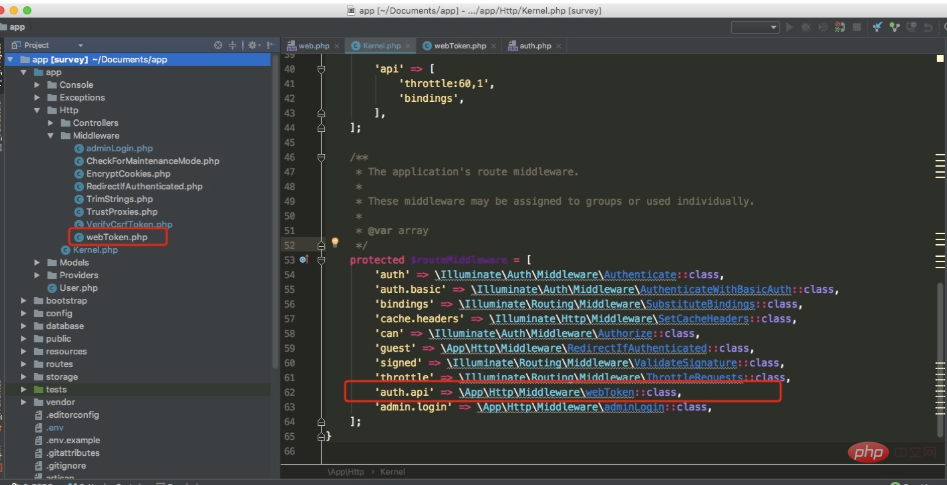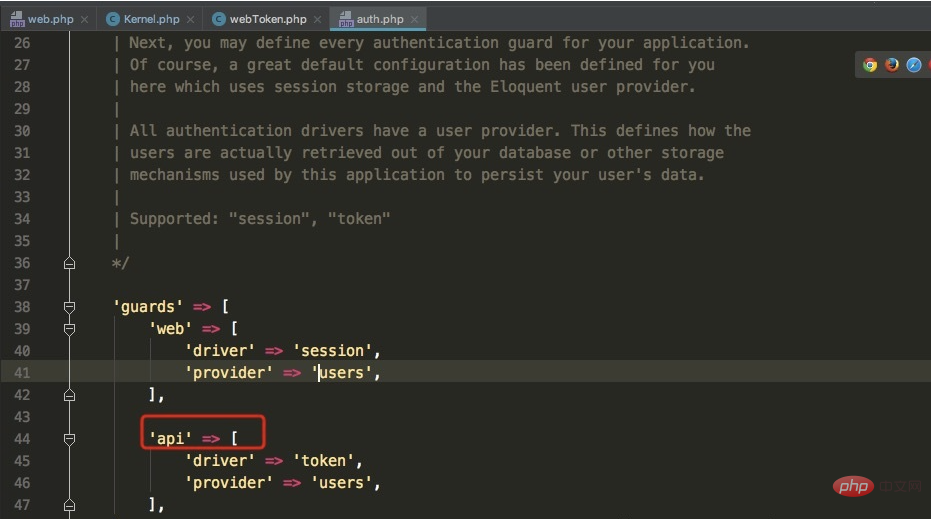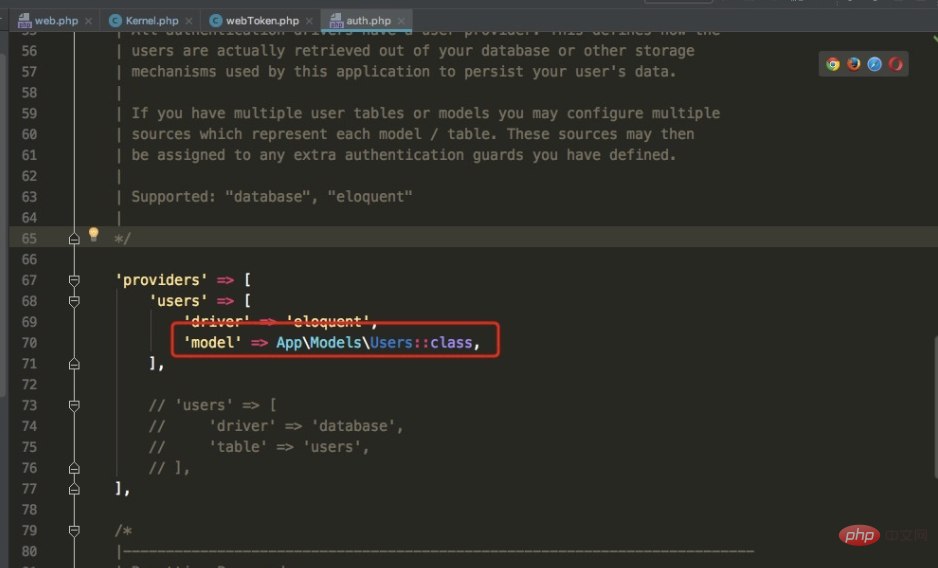How Laravel uses ApiToken to authenticate requests
The following tutorial column of Laravel Getting Started will introduce you to the method of using ApiToken authentication request in Laravel. I hope it will be helpful to friends in need!

1. Open the database/migrations/2014_10_12_000000_create_users_table.php migration file. We need to change the structure of the user table.
2. We need to add api_token field, that is to say, our token is saved in the database. In the appropriate location, add a row
$table->string('api_token', 60)->unique();
3. Configure the database and generate the user table through the php artisan migrate command
4. In the user table, add a record at will, as long as the api_token field is set to 123456. In this way, we generate a user, and we can use the token value 123456 to log in later.
5. Return to the routing file routes.php, add a test route in it, and protect it with laravel middleware
Route::group(['middleware' => ['auth.api']], function () {
Route::get('/t', function () {
return 'ok';
});
});Here, the auth.api middleware is used, and the middleware definition Enter the picture below:

Create WebToken.php in the Middleware file, and then register the middleware in the Kernel.php file
'auth.api' => \App\Http\Middleware\webToken::class,
6. Open the just created The webToken middleware code is as follows
<?php
namespace App\Http\Middleware;
use Closure;
use Illuminate\Support\Facades\Auth;
class webToken
{
/**
* Handle an incoming request.
*
* @param \Illuminate\Http\Request $request
* @param \Closure $next
* @return mixed
*/
public function handle($request, Closure $next)
{
if (Auth::guard('api')->guest()) {
return response()->json(['code' => 401,'msg' => '未设置token']);
}
return $next($request);
}
}The api of Auth::guard('api') in the code is the auth.php file in the config folder


7. After making the above modifications, when we directly initiate a request to the server with the URL path /t, the server will return a 401 error and a 'token not set' Such a message is what we set in the handle() method before. In other words, /t has been protected by our auth middleware. If we want our request to pass through this middleware normally, we must provide the token .
8. Since we previously added a piece of data with api_token 123456 in the user table, now we request /t from the server again, but this time we add api_token, which is
…/t?api_token=123456
Under normal circumstances, the server will return 'ok', which means that the auth middleware allows this request to pass. But when we change 123456 to other values, this request cannot pass the auth middleware.
For more laravel framework technical articles, please visit laraveltutorial!
The above is the detailed content of How Laravel uses ApiToken to authenticate requests. For more information, please follow other related articles on the PHP Chinese website!

Hot AI Tools

Undresser.AI Undress
AI-powered app for creating realistic nude photos

AI Clothes Remover
Online AI tool for removing clothes from photos.

Undress AI Tool
Undress images for free

Clothoff.io
AI clothes remover

Video Face Swap
Swap faces in any video effortlessly with our completely free AI face swap tool!

Hot Article

Hot Tools

Notepad++7.3.1
Easy-to-use and free code editor

SublimeText3 Chinese version
Chinese version, very easy to use

Zend Studio 13.0.1
Powerful PHP integrated development environment

Dreamweaver CS6
Visual web development tools

SublimeText3 Mac version
God-level code editing software (SublimeText3)

Hot Topics
 How to implement the custom table function of clicking to add data in dcat admin?
Apr 01, 2025 am 07:09 AM
How to implement the custom table function of clicking to add data in dcat admin?
Apr 01, 2025 am 07:09 AM
How to implement the table function of custom click to add data in dcatadmin (laravel-admin) When using dcat...
 How to get the return code when email sending fails in Laravel?
Apr 01, 2025 pm 02:45 PM
How to get the return code when email sending fails in Laravel?
Apr 01, 2025 pm 02:45 PM
Method for obtaining the return code when Laravel email sending fails. When using Laravel to develop applications, you often encounter situations where you need to send verification codes. And in reality...
 Laravel Redis connection sharing: Why does the select method affect other connections?
Apr 01, 2025 am 07:45 AM
Laravel Redis connection sharing: Why does the select method affect other connections?
Apr 01, 2025 am 07:45 AM
The impact of sharing of Redis connections in Laravel framework and select methods When using Laravel framework and Redis, developers may encounter a problem: through configuration...
 Laravel multi-tenant extension stancl/tenancy: How to customize the host address of a tenant database connection?
Apr 01, 2025 am 09:09 AM
Laravel multi-tenant extension stancl/tenancy: How to customize the host address of a tenant database connection?
Apr 01, 2025 am 09:09 AM
Custom tenant database connection in Laravel multi-tenant extension package stancl/tenancy When building multi-tenant applications using Laravel multi-tenant extension package stancl/tenancy,...
 Laravel Eloquent ORM in Bangla partial model search)
Apr 08, 2025 pm 02:06 PM
Laravel Eloquent ORM in Bangla partial model search)
Apr 08, 2025 pm 02:06 PM
LaravelEloquent Model Retrieval: Easily obtaining database data EloquentORM provides a concise and easy-to-understand way to operate the database. This article will introduce various Eloquent model search techniques in detail to help you obtain data from the database efficiently. 1. Get all records. Use the all() method to get all records in the database table: useApp\Models\Post;$posts=Post::all(); This will return a collection. You can access data using foreach loop or other collection methods: foreach($postsas$post){echo$post->
 How to effectively check the validity of Redis connections in Laravel6 project?
Apr 01, 2025 pm 02:00 PM
How to effectively check the validity of Redis connections in Laravel6 project?
Apr 01, 2025 pm 02:00 PM
How to check the validity of Redis connections in Laravel6 projects is a common problem, especially when projects rely on Redis for business processing. The following is...
 Laravel Introduction Example
Apr 18, 2025 pm 12:45 PM
Laravel Introduction Example
Apr 18, 2025 pm 12:45 PM
Laravel is a PHP framework for easy building of web applications. It provides a range of powerful features including: Installation: Install the Laravel CLI globally with Composer and create applications in the project directory. Routing: Define the relationship between the URL and the handler in routes/web.php. View: Create a view in resources/views to render the application's interface. Database Integration: Provides out-of-the-box integration with databases such as MySQL and uses migration to create and modify tables. Model and Controller: The model represents the database entity and the controller processes HTTP requests.
 Laravel database migration encounters duplicate class definition: How to resolve duplicate generation of migration files and class name conflicts?
Apr 01, 2025 pm 12:21 PM
Laravel database migration encounters duplicate class definition: How to resolve duplicate generation of migration files and class name conflicts?
Apr 01, 2025 pm 12:21 PM
A problem of duplicate class definition during Laravel database migration occurs. When using the Laravel framework for database migration, developers may encounter "classes have been used...






